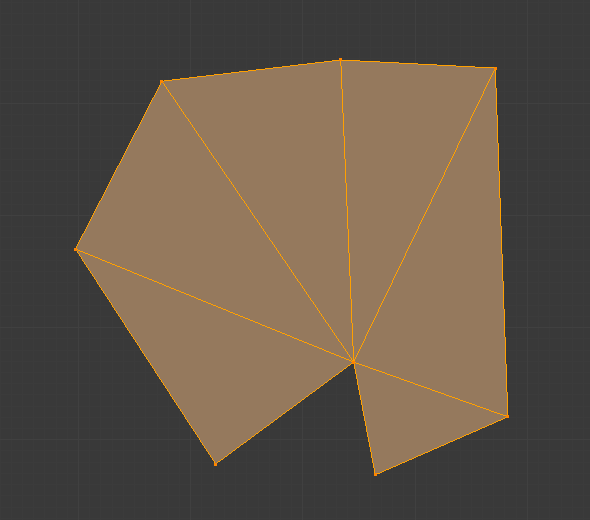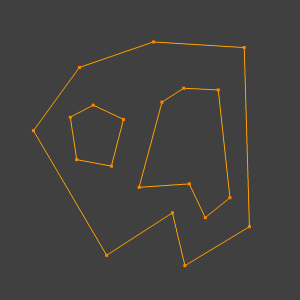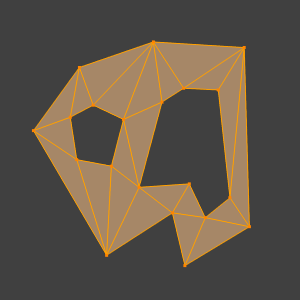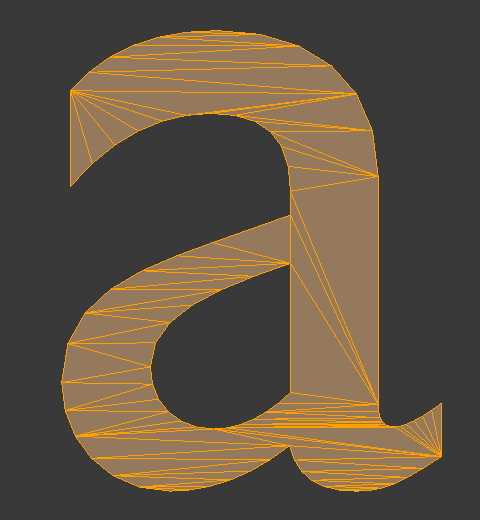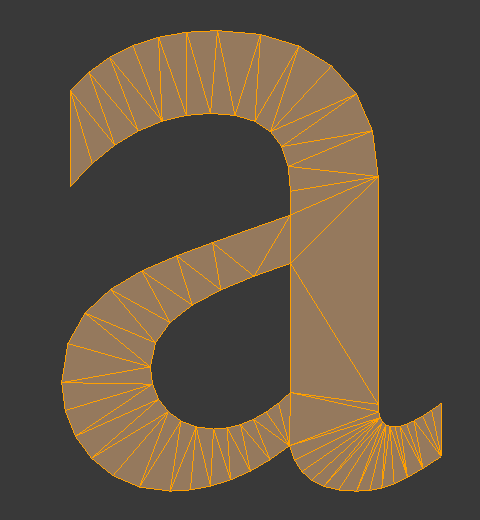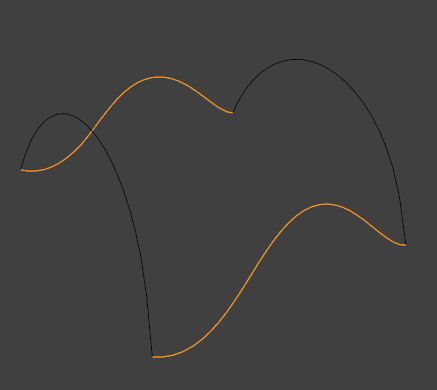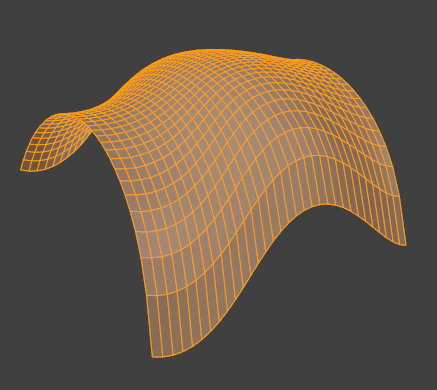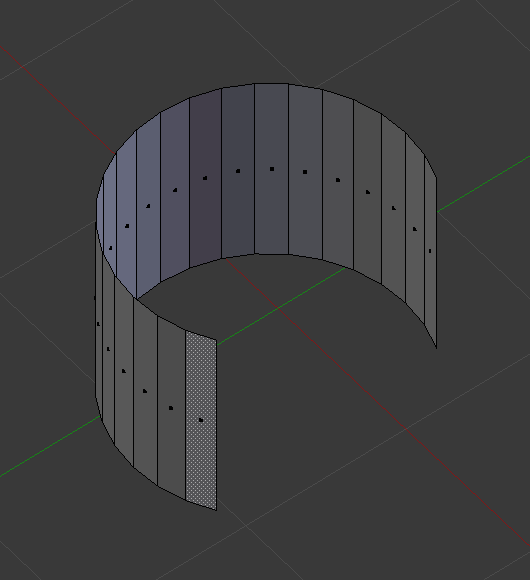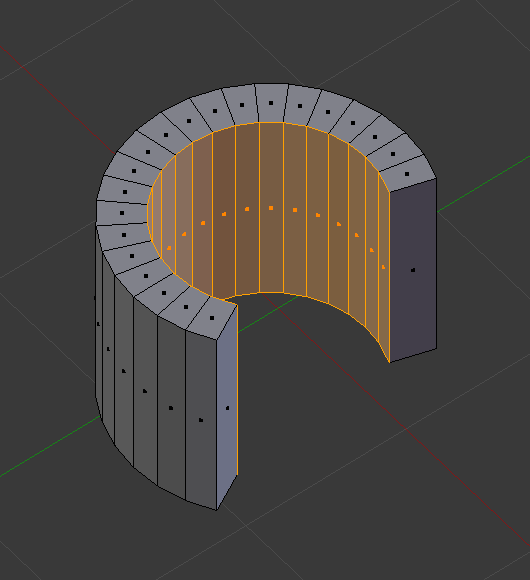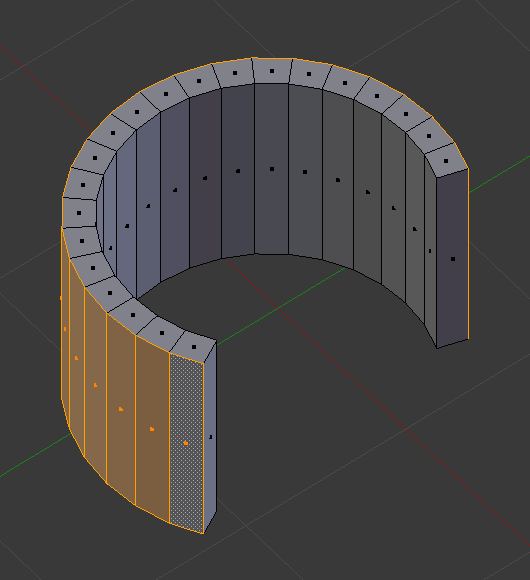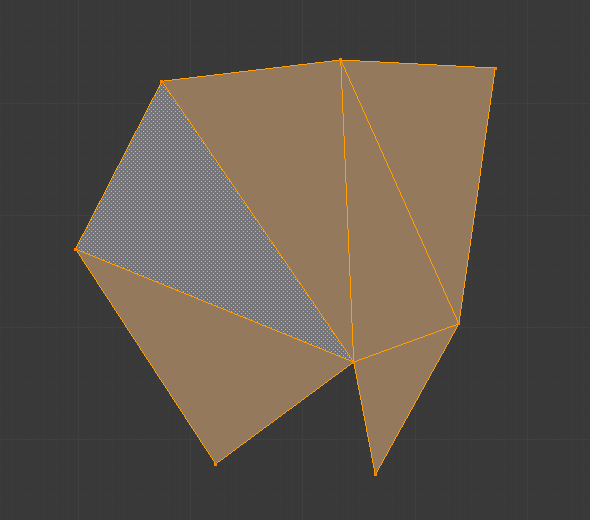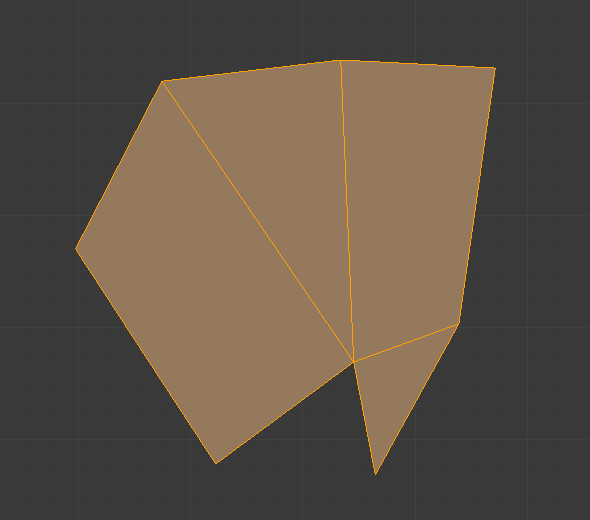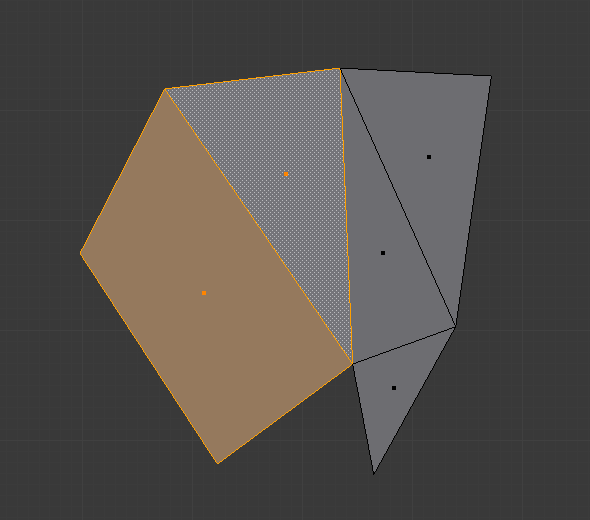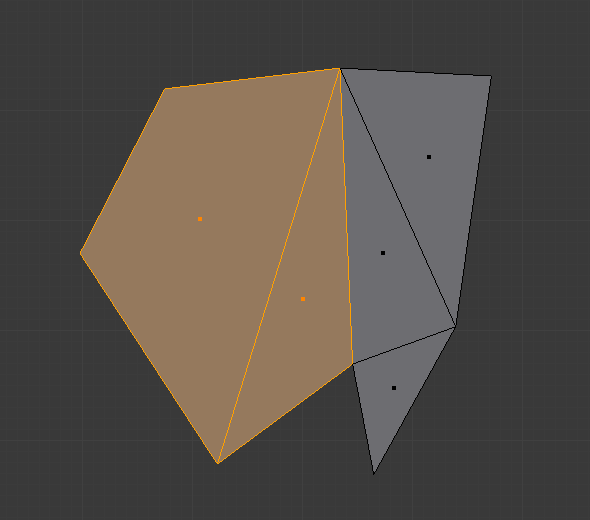Ferramentas para faces¶
Referência
| Mode: | Edit Mode |
|---|---|
| Menu: | |
| Hotkey: | Ctrl-F |
Estas são ferramentas que manipulam faces.
Preencher¶
Referência
| Mode: | Edit Mode |
|---|---|
| Menu: | |
| Hotkey: | Alt-F |
A opção Preencher irá criar faces triangulares a partir de qualquer grupo de arestas ou vértices selecionados, contando que eles formem um ou mais perímetros completos.
- Beauty
- Arrange the new triangles nicely.
Note que, diferentemente da criação de multiláteros, o comando Preencher tem suporte a orifícios.
Beautify Faces¶
Referência
| Mode: | Edit Mode |
|---|---|
| Menu: |
Beautify Faces works only on selected existing faces. It rearrange selected triangles to obtain more «balanced» ones (i.e. less long thin triangles).
- Ângulo máximo
- Uma opção de delimitação de ângulo para limitar a rotação das arestas para superfícies achatadas.
Preenchimento de grade¶
Referência
| Mode: | Edit Mode |
|---|---|
| Menu: |
Grid Fill uses a pair of connected edge loops or a single, closed edge loop to fill in a grid that follows the surrounding geometry.
The best predictable result can be achieved if you select two opposite edge loops with an equal number of vertices. When a single, closed edge loop is selected, the Span/Offset options allows you to adjust the way two opposite edge loops are detected from one closed edge loop.
- Span
- Specifies the number of columns in the grid.
- Deslocamento
- Defines the vertex that is considered to be the corner of the grid, by default, it’s the active vertex. The Offset allows you to rotate the grid lines.
- Mesclagem simples
- Use a simple interpolation algorithm to generate grid vertices from boundary loops, which doesn’t attempt to maintain the shape, useful for flat surfaces or times when keeping the shape gives odd results.
Solidificar¶
Referência
| Mode: | Edit Mode |
|---|---|
| Menu: |
This takes a selection of faces and solidifies them by extruding them uniformly to give volume to a non-manifold surface. This is also available as a Modifier. After using the tool, you can set the offset distance in the Adjust Last Operation panel.
- Espessura
- A quantidade de deslocamento para a superfície recém criada. Valores positivos deslocam a superfície para a direção interna em relação a direção na qual apontam as normais. Valores negativos deslocam a superfície para a direção externa.
Interseccionar¶
Interseccionar (Via ferramenta de faca)¶
Referência
| Mode: | Edit Mode |
|---|---|
| Menu: |
A ferramenta de intersecção permite que você corte intersecções em uma geometria. Ela é um pouco parecida com a ferramenta de operações boolianas, mas, não calcula interiores ou exteriores. As faces são divididas ao longo das intersecções, deixando as novas arestas selecionadas.
- Fonte
- Selecionados ou não selecionados
- Operate between the selected and unselected geometry.
- Intersecção interna
- Operate on the overlapping geometry of the mesh.
- Modo de separação
- Todos
- Splits the geometry at the new edge.
- Cortar
- Keep each side of the intersection separate without splitting the faces in half.
- Fundir
- Funde toda a geometria a partir da intersecção.
- Ajuste de fusão
- See Intersect (Boolean).
Interseccionar (Via ferramenta booliana)¶
Referência
| Mode: | Edit Mode |
|---|---|
| Menu: |
Performs boolean operations with the selection on the unselected geometry. While the Operação booliana is useful for non-destructive edits, access to booleans with a tool in Edit Mode can be useful to quickly perform edits.
- Booliana
- Diferença, União, Intersecção
- Trocar
- Altera a ordem da operação.
- Ajuste de fusão
Tolerance for close faces to be considered touching, It may be useful to increase this when some intersections aren’t detected that should be and when extra geometry is being created because edges aren’t detected as overlapping.
Aviso
A threshold approaching size of faces may cause very slow calculation, in general keep this value small.
Aramado¶
Referência
| Mode: | Edit Mode |
|---|---|
| Menu: |
The Wireframe tool makes a wireframe from faces by turning edges into wireframe tubes, similar to the Aramado.
Atiçar faces¶
Referência
| Mode: | Edit Mode |
|---|---|
| Menu: |
Splits each selected faces into a triangle fan, creating a new center vertex and triangles between the original face edges and new center vertex. The Offset can be used to make spikes or depressions.
- Deslocar atiçamento
- Offset the new center vertex along the face normal.
- Deslocamento relativo
- Multiply the Offset by the average length from the center to the face vertices.
- Atiçar centro
Computes the center of a face.
- Weighted Mean
- Using the mean average weighted by edge length.
- Mean
- Using the mean average.
- Bounds
- Uses center of bounding box.
Triangular faces¶
Referência
| Mode: | Edit Mode |
|---|---|
| Menu: | |
| Hotkey: | Ctrl-T |
This tool converts each of the selected faces (whether it be quads or n-gons) to triangular faces. See the Triangular.
Triângulos para quadriláteros¶
Referência
| Mode: | Edit Mode |
|---|---|
| Menu: | |
| Hotkey: | Alt-J |
This tool converts the selected triangles into quads by taking adjacent triangles and removing the shared edge to create a quad, based on a threshold. This tool can be applied on a selection of multiple triangles.
This means you can select the entire mesh and convert triangles that already form square shapes – to be converted into quads, without having to concern yourself with individual faces.
Alternatively you can force this operation selecting a pairs of faces (see hint below for other ways of joining).
To create a quad, this tool needs at least two adjacent triangles. If you have an even number of selected triangles, it is also possible not to obtain only quads. In fact, this tool tries to create most even rectangular quads from the given triangles, which means some triangles could remain.
All the menu entries and hotkeys use the settings defined in the Operator panel:
- Ângulo máximo
- This value, between (0 to 180), controls the threshold for this tool to work on adjacent triangles. With a threshold of 0.0, it will only join adjacent triangles that form a perfect rectangle (i.e. right-angled triangles sharing their hypotenuses). Larger values are required for triangles with a shared edge that is small, relative to the size of the other edges of the triangles.
- Comparar UVs
- When enabled, it will prevent the union of triangles that are not also adjacent in the active UV map.
- Comparar cores dos vértices
- When enabled, it will prevent the union of triangles that have no matching vertex color.
- Comparar ressaltos
- When enabled, it will prevent the union of triangles that share an edge marked as sharp.
- Comparar materiais
- When enabled, it will prevent the union of triangles that do not have the same material assigned.
Dica
When isolated groups of faces are selected, they can be combined with Create Face or Dissolve Faces; this is not limited to quads.
Soldar arestas criando faces¶
Referência
| Mode: | Edit Mode |
|---|---|
| Menu: |
A tool to split selected faces by loose wire edges. This can be used in a similar way to the Knife tool, but the edges are manually setup first.
Rotacionar arestas¶
Referência
| Mode: | Edit Mode |
|---|---|
| Menu: |
This tool functions the same edge rotation in edge mode. It works on the shared edge between two faces and rotates that edge if the edge was selected.
See Rotate Edge for more information.
Rotacionar e inverter¶
- Rotacionar / Inverter UVs
- See Espelhar faces e rotacionar UVs.
- Rotacionar cores
- Rotates the Vertex Colors inside faces either clockwise or counterclockwise.
- Inverter as cores
- Flips the direction of Vertex Colors inside the selected faces.
Normais¶
See Editing Normals for more information.
